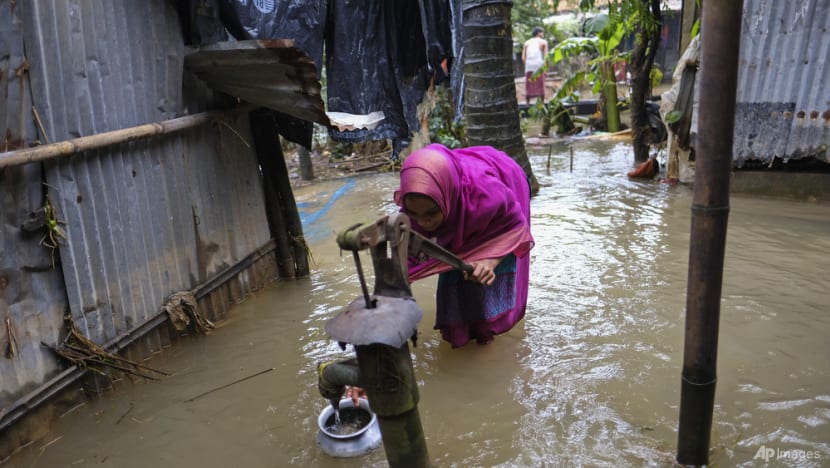COP28: Unanswered questions about loss and damage deal leave Asia's environmental and indigenous groups wary
Wealthy nations have pledged hundreds of millions in financial assistance to the poorest countries. But those who need it are wary about big promises made about loss and damage at the United Nations-led talks.


This audio is generated by an AI tool.
DUBAI: Communities on the frontline of climate change in Asia face no guarantees of receiving a share of landmark financial assistance agreed upon by 200 nations at global climate change talks in Dubai on Thursday (Nov 30).
Environmental advocacy and indigenous rights groups observing the United Nations-led Conference of the Parties (COP28) had mixed reactions to the potentially historic pledge to operationalise a loss and damage fund after years of tense negotiations.
Loss and damage is the notion that the countries historically responsible for planet-warming emissions should financially help nations bearing the worst of the impacts.
On the opening day of COP28, nations agreed to a scheme that will be initially housed in the World Bank, which would disburse the funds. More than US$400 million has been pledged collectively from sources including COP host, the United Arab Emirates, the European Union and the United Kingdom.
But exactly who would receive the assistance, when it would be delivered and in what form remain key questions. How the funds would be replenished over a proposed four-year cycle has also not been addressed.
These uncertainties leave communities and organisations in Southeast Asia that have pushed for a focus on loss and damage wary.
“Actually we have a mixed reaction about the adoption of this, but still we are very thankful because loss and damage is moving forward. We can say that indigenous peoples are not totally left behind,” said Mr Nicky Batang-ay, a member of the climate and biodiversity programme at Tebtebba Foundation, a Philippines-based indigenous rights group.
The agreed text makes clear that indigenous peoples have the right to be active observers of the fund’s board meetings and to directly access finances through a small grants programme.
How the World Bank can operationalise funds directly to such groups, though, remains unclear.
“I don't have full faith in these things,” said Mr Muhammad Arman from the Indigenous Peoples’ Alliance of the Archipelago (AMAN), an Indonesian organisation.
Without clearer mandates for climate mitigation and the end to extractive activities in indigenous domains, sending more money would not amount to much, he said.
“The analogy I use is that the right hand might be doing something good … while the left hand continues to do bad things,” he said.
Ms Alexandra Matei, the Asia regional advocacy advisor for CARE, a humanitarian agency, said the loss and damage fund “must not remain an empty promise”.
While a landmark day for climate justice, the agreement has many shortcomings, she said. “It enables historical emitters to evade their responsibility. It also fails to establish the scale of finance needed and ensure that the fund is anchored in human rights principles,” she added.
The United States, the biggest carbon emitter in history, pledged US$17.5 million and insists contributions should be on a voluntary basis.
The sums pledged so far are purely “symbolic” and just a fraction of what is actually needed to make a difference to communities already facing extreme weather and suffering intangible losses of culture and heritage, according to Dr Aditi Mukherji, director of the Climate Change Adaptation and Mitigation Impact Action Platform at CGIAR, the world’s largest global agricultural innovation network.
“One of the fears is that it does remain a symbolic fund,” she said. “Or does it rise up to the actual challenge that there is with climate justice at the heart of it?”
Scientific research has become a powerful tool for communities to be able to prove that climate change had caused certain events and to be able to quantify many of the losses suffered, she said.
But there is still a lack of it, including for Asia, hindering communities’ ability to seek redress.
Helping developing countries most impacted by climate change is more urgent than ever. A 2022 report by the Climate Vulnerable Forum found that 20 per cent of the wealth of the most vulnerable nations in the world, including the Philippines, Vietnam, Timor-Leste and Cambodia, has been eliminated because of climate change over the last two decades.
Ms Lien Vandamme, a senior campaigner at the Center for International Environment Law (CIEL), said wealthy nations had failed for years to take the appropriate actions to prevent such harm to their poorer counterparts.
She argued that the fund, as it has been designed and agreed upon so far, will not redress climate harm. In fact, she said it is far from what impacted communities have been asking for and what developed nations are obligated to do under international law.
“There are many limitations to what was agreed. I would just consider this a small step,” she said.
“As long as there's not hundreds of billions of dollars flowing through the fund, that affected communities aren’t in the driver's seat and that there aren’t policies in place to ensure that the funds in all respects promote and protect human rights, we cannot really call this a major success,” she said.

















